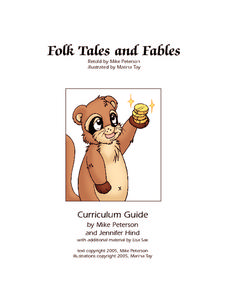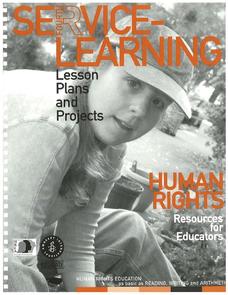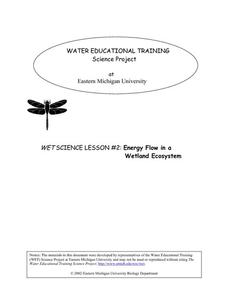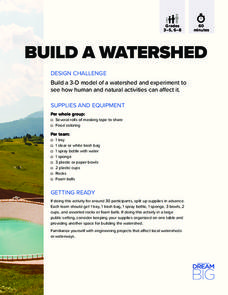Channel Islands Film
Human Impact on the Food Web of Santa Cruz Island
What happens when a non-native species is introduced onto an island? Santa Cruz Island, part of the Channel Island chain located off the coast of southern California, provides the perfect laboratory for young environmental scientists to...
Grand Erie District School Board
Model Cell Project
If you're finishing up a unit on cells, here's a great project to get kids collaborating and recalling what they've learned in a fun and tangible way. Small groups create plant or animal cells out of materials they have at home. They use...
Wild BC
Bearly Any Ice
After reviewing food chains, your class members participate in an arctic predator-prey game that exemplifies the impact of climate change of food availability. If you are in a hurry, skip this instructional activity, but if you have the...
VT FEED
The Origins of Civilization and Agriculture: Integrating the Study of Food
What role has food played in the rise and changing nature of civilizations? Here you'll find a fantastic set of lessons and materials on such topics as where food is grown in the United States, the food of ancient peoples,...
Consortium for Ocean Science Exploration and Engagement (COSEE)
Carbon Dioxide & Krill: Impacts
What effects do temperature and carbon dioxide levels have on the zooplankton of Antarctica? This concluding lesson plan in a short unit on climate change and the ocean helps environmental scientists answer these questions. After...
Curated OER
Periodic Table of Fun
Are you looking to put the fun back in the fundamentals of chemistry? Why not have groups create their own periodic tables of something (animals, food, music groups, etc.) practicing the organizational strategies used in the periodic...
University of Georgia
Land Biomes Project
Challenge scholars to research a biome and create a presentation for the producers of Survivor to choose their ecosystem for the next season's show. The materials include outlines, worksheets, and grading rubrics for individuals as well...
Curated OER
Ecosystems
A critical look into the structure and function of ecosystems is here for young learners as a series of lessons and worksheet activities. Topics covered include land-based and marine ecosystems, connections to the water cycle, food webs,...
Curated OER
Growing Minds: My Plate
Examine food choices and the nutritional properties of food groups with this visually appealing whole-class lesson plan. This will take a bit of preparation, but once you do it, you can use the materials for years. Using a food groups...
Alabama Learning Exchange
Nature's Life Cycle
Become a member of the Pollution Patrol and stand up to litter! After discussing the life cycle of seeds and discussing how plants figure into the food chain, young conservationists engage in several activities involving podcasts,...
Curated OER
Edible GMOs?
The debate over genetically modified organisms is on! Young biologists imagine that they have been asked to choose which corn chips will be sold for a fundraiser, one made with GMOs or one without. This four-day lesson plan requires...
Curated OER
Sustainability and Extinction
Galapagos Penguins are the only penguins on earth that live north of the equator (in the wild). In this last lesson plan a discussion on how the Galapagos islands developed their populations and diversity sparks the introduction. Two...
Weekly Story Book
Folk Tales and Fables
Pages and pages of engaging activities, worksheets, and writing projects on teaching folktales and fables await you! You don't want to miss this incredible resource that not only includes a wide range of topics and graphic organizers,...
Captain Planet Foundation
Rotting Away
What happens at the end of a plant's life cycle? Show kids the natural way that plants show that they're decomposing, as well as the importance of compost, with a lesson about living organisms. After reading Log Cabin by Anne Schreiber,...
Amnesty International
Human Rights and Service Learning (Part 1)
What better way is there to teach about human rights than by seeing them firsthand? Introduce your class or club to the spirit of service through a myriad of service project ideas. First in a series of human rights instructional...
New York State Department of Environmental Conservation
Adaptations – Designs for Survival
What's the difference between behavioral adaptations and physical adaptations? Learn about the various ways that organisms adapt to their environment with a worksheet about the creatures of the Hudson River.
Curated OER
Testing for Life’s Molecules
Want to hear a joke about sodium? Na. Young scientists test various materials to identify if they include protein, starch, and glucose by using the Biuret test, iodine starch test, and Benedict's test respectively. After practicing with...
Curated OER
The Chesapeake Bay in Captain John Smith's Time
When Captain John Smith visited the Chesapeake Bay in the summer of 1608, what types of animals and habitats did he encounter? Your young historians will analyze primary source documents to answer this question, as well as compare the...
Penguin Books
A Teacher's Guide to The Omnivore’s Dilemma: A Natural History of Four Meals by Michael Pollan
"What should we have for dinner?" "What am I eating?" "Where did it come from?" These three questions are at the heart of Michael Pollan's The Omnivore's Dilemma: A Natural History of Four Meals. Pollan's book provides some very...
Eastern Michigan University
Energy Flow in a Wetland Ecosystem
How is energy transferred within an ecosystem? What would happen to a food web if one of the organisms was removed? Elementary or middle school ecologists examine these questions and more in a comprehensive 5E learning cycle lesson....
Curated OER
Circle of Life
Here is a well-designed science lesson plan that shows learners that everything that organisms do in ecosystems, including running, breathing, burrowing, growing, requires energy. After a thorough discussion of their own eating and...
Polar Trec
Why Can’t I Eat This Fish?
Can turning on the television lead to toxins in the food supply? The lesson offers an opportunity for young scientists to complete guided research. A worksheet lists each question as well as the web page necessary to answer the question....
Curated OER
Hunger in the World
Background information is a great tool for any teacher. This resource provides background information on nutrition and world hunger, as well as ten different activity options to help learners understand this global issue. Each activity...
DiscoverE
Build a Watershed
What's the best way to learn how watersheds work? Build one! Combining engineering, the water cycle, and ecology concerns, the activity is the perfect fit for an interdisciplinary unit. Teams construct a model watershed with simple...

























